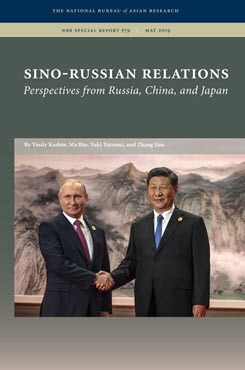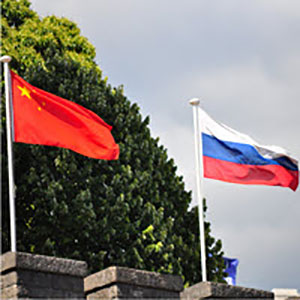Russian-Chinese Cooperation
A Russian Perspective
This essay examines Russia-China relations in the political, security, economic, and foreign policy realms and assesses the implications for Russian grand strategy.
EXECUTIVE SUMMARY
MAIN ARGUMENT
Russian policy toward China has a high level of continuity with the Soviet approach during the final years of the Cold War. Soviet and Russian engagement with China in the late 1980s and early 1990s started as an attempt to undo the damage to Moscow’s foreign policy and security interests in Asia caused by the Sino-Soviet split in the 1960s. The foundation of the current partnership was largely established in the pre-Putin era by Boris Yeltsin. Repairing relations with the wider Asia-Pacific and ensuring the security interests of Russia were the primary goals of engagement with China. This approach to China is based on a complex system of intertwined political, security, and economic interests. Russia is keen to use great-power competition between the U.S. and China to achieve political and economic gains while maintaining an independent foreign policy. But in the aftermath of the Ukraine crisis, this strategy has become highly unrealistic, and Russia finds itself increasingly aligned with China.
POLICY IMPLICATIONS
- Russian policymakers long ago ruled out any possibility of teaming up with a third party against China, mainly due to the painful lessons of the Sino-Soviet split during the Cold War. At the same time, their resolve to further deepen cooperation with China is strongly affected by the climate of Russian relations with the West. In case relations with the West normalize, traditional distrust and fear of dependence on China could significantly slow down the progress in cooperation.
- Russia is committed to expanding security cooperation with China. The current level of military-to-military cooperation is the most comprehensive that Russia has ever had with a major power. However, significant distrust persists in the security domain, as shown by the existence of active mutual espionage activities.
- Russia is becoming increasingly dependent on China economically and has tried to address this issue by implementing new multilateral initiatives in Asia (e.g., the “greater Eurasia” concept).
- Although Russia seeks to avoid overdependence on China, at this stage it does not see this overdependence as an imminent danger. However, that assessment could change in the next decade if the current trends in trade relations with the European Union and China continue.
Vasily Kashin is a Senior Researcher for the Higher School of Economics and at the Far Eastern Studies Institute Northeast Asia Center.



